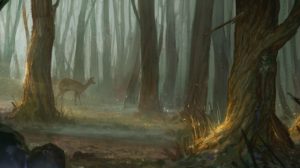The other morning, I was out on a walk in the village of Geneseo not too far from Highland Park. I was appreciating the general beauty of the leaf-scattered sidewalks and street, admiring the architecture of the buildings around me. There was a fog resting just overhead, lending to the ambience of the scene before me. As I walked, I happened to glance down a street to my left and noticed a figure silhouetted against the grey weather and motley streets. It took a moment for me to realize that the figure staring back at me was a deer. The deer was tense and startled by my presence and yet, I could not help but observe that the deer also appeared to me as forlorn, in the way that it turned to me. It stared at me a moment then turned slowly and walked off into a backyard. The deer left me feeling strangely melancholy and saddened. I pondered for a while, why did this animal going about its business, strike me in such a manner?
Pondering this topic, I was suddenly reminded of two words that Dr. McCoy introduced to our class earlier in the semester. She introduced the words during a discussion we were having about The Bacchae and Dionysus’s presence in Thebes. The words were autochthonous and allochthonous. Autochthonous is defined as “Native to the place inhabited; indigenous. Originating in the place where found.” By contrast allochthonous and it is defined as something, “formed elsewhere than in situ and hence not autochthonous.” Allochthonous is in large part used as a geological term.
While thinking about the two words and through a discussion with Dr McCoy, I realized an interesting duality in the character of Dionysus in the Bacchae. Despite him originally being from Thebes, so in a way autochthonous to the landscape of Thebes, he is also allochthonous to Thebes. Dionysus is allochthonous to Thebes because he has been away from Thebes for most of his life. When Dionysus finally comes back to Thebes (to clear his mother’s name, etc.), this certainly aids in his allochthonous presence in Thebes. Additionally, through the frenzy that he creates within the city of Thebes, he could be considered allochthonous because of his tornado-like impact on the women of Thebes. He does not attempt to intergrate back into the culture of Thebes indeed he does quite the opposite. He sets himself and his followers purposefully apart from the rest of Thebes. Similar to the duality that Dionysus exhibits in his interactions with Thebes, there is a duality in the deer in the town situation. In the moments that I stared back at that solitary deer framed in the fog, I felt that myself and the entire town of Geneseo was allochthonous. I felt as though I was the oddity there, not the deer. I felt like Dionysus and his frenzy bearing down on the city of Thebes creating havoc and disorder when there was calm and peace before my (and the town’s) presence there. Yet, even as I began to feel out of place, I knew myself to be in place. Humans and wildlife have long interacted and have coexisted. Why then did I feel allochthonous to the landscape that I was in? I have come to think that it is because of the way in which we as humans interact with the natural world that surrounds us. We [“We” here is being used as a gross generalization, I do not mean to speak for all human beings, by any means] distance ourselves from nature, set ourselves apart. We do not try to make our homes, lives, and thoughts integrate into the landscape, we do not attempt to work with nature as it is, unaltered. Yes, we have parks and trees within towns and cities, but we do not incorporate the chaotic elements of nature into our lives. We attempt to leave the chaos, the frenzy of nature to the forests and woodlands that we are constantly chopping away at.
I think that humanity [again, a gross generalization, I am sure that there are many exceptions to this] has long been allochthonous to nature. We have long been actively distancing ourselves from our roots, from the fact that we are mammals and, by extension, animals. We are trying to set ourselves apart and above nature. We try to distance ourselves from other animals, refusing to associate ourselves with beings that we think are lesser.
I take Dionysus’s allochthonous presence in Thebes as a warning of what not to do and I encourage others to do so as well. I cannot hope to rebuild the massive old mansion I live in, in an attempt to make it incorporate into the natural world more seamlessly, nor do I encourage anyone else to go that far. But I will encourage people to be more mindful. Be aware of the ways in which you interact with nature and remember that you are a part of it, you are autochthonous to this landscape no matter how allochthonous you may feel. Remember your place and respect it, recognize the gift and responsibilities of that place.
Euripides. The Bacchae. Penguin Group, 2005.

